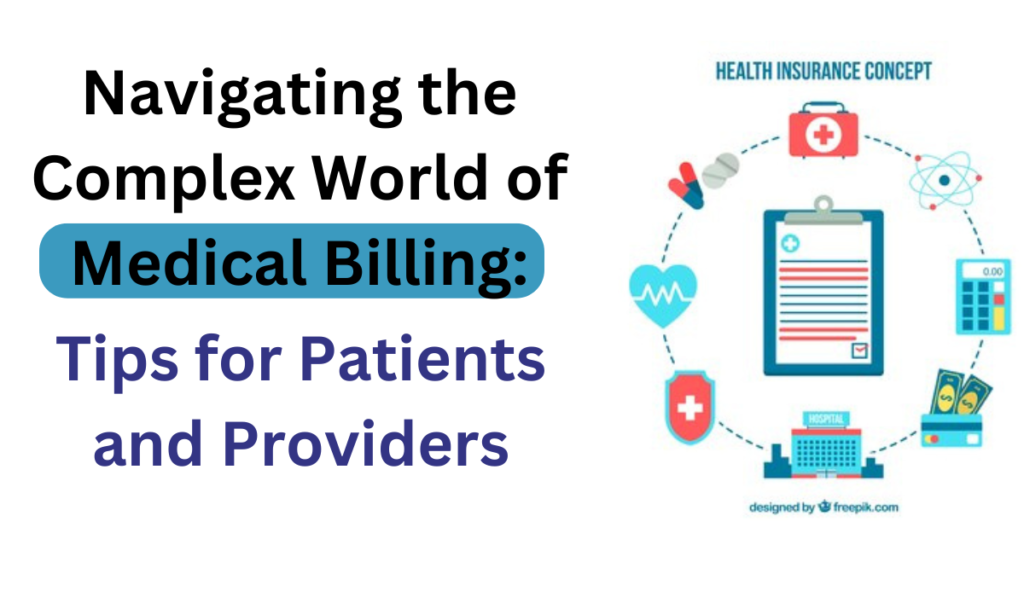Navigating the Complex World of Medical Billing: Tips for Patients and Providers
Medical billing can be a confusing and overwhelming process for both patients and healthcare providers. With the ever-changing landscape of healthcare policies and regulations, it’s important to understand the intricacies of medical billing to ensure accurate and efficient payment processing. In this article, we will provide tips for patients and providers on navigating the complex world of medical billing.
Understanding Medical Billing Basics
1. What is medical billing? Medical billing is the process of submitting and following up on claims with health insurance companies in order to receive payment for services rendered by a healthcare provider. This process involves coding diagnoses and procedures, obtaining pre-authorizations, and coordinating with insurance companies to ensure accurate reimbursement.
2. Who is involved in the medical billing process? The medical billing process can involve several stakeholders, including healthcare providers, medical coders, insurance companies, and patients. Each party plays a crucial role in ensuring that claims are submitted accurately and in a timely manner.
3. Why is medical billing important? Medical billing is essential for healthcare providers to receive payment for their services, as well as for patients to understand their financial responsibilities. Proper medical billing also helps to maintain accurate medical records and ensures compliance with healthcare regulations.
Tips for Patients
4. Understand your insurance coverage: Before receiving medical services, it’s important to understand your insurance coverage, including any deductibles, co-pays, and out-of-pocket expenses. This will help you avoid unexpected costs and ensure that you can afford the care you need.
5. Review your medical bills: After receiving medical services, carefully review your medical bills for any errors or discrepancies. If you have any questions or concerns about your bill, don’t hesitate to contact your healthcare provider or insurance company for clarification.
6. Be proactive in addressing billing issues: If you encounter billing issues, such as denied claims or incorrect charges, be proactive in addressing them. Contact your healthcare provider or insurance company to resolve the issue promptly and avoid potential financial consequences.
Tips for Providers
7. Ensure accurate coding: Proper coding is crucial for accurate medical billing. Healthcare providers should train their staff on the latest coding guidelines and regularly review claims for coding errors. This will help minimize claim denials and ensure timely reimbursement.
8. Verify insurance coverage: Before providing medical services, it’s important to verify patients’ insurance coverage and eligibility. This will help prevent claim denials and ensure that patients are aware of their financial responsibilities upfront.
9. Communicate openly with patients: Transparency in billing practices is key to maintaining trust with patients. Healthcare providers should communicate openly with patients about their billing processes, including any out-of-pocket expenses and available payment options.
Common Medical Billing FAQs
10. What is the difference between a deductible and a co-pay? A deductible is the amount a patient must pay out-of-pocket before their insurance coverage kicks in, while a co-pay is a fixed amount that a patient pays for each medical service or prescription.
11. How can I appeal a denied claim? If a claim is denied by an insurance company, patients can appeal the decision by providing additional documentation or evidence to support the claim. Healthcare providers can assist patients in the appeals process and advocate on their behalf.
12. Can I negotiate my medical bills? Patients can often negotiate their medical bills, especially if they are facing financial hardship. Healthcare providers may be willing to offer discounts or payment plans to help patients afford the care they need.
13. What should I do if I receive a surprise medical bill? If you receive a surprise medical bill for services that you did not expect or did not authorize, contact your healthcare provider or insurance company immediately to resolve the issue. It’s important to address surprise bills promptly to avoid potential financial repercussions.
14. How can I protect my personal information during the medical billing process? Patients should be vigilant about protecting their personal information during the medical billing process. This includes safeguarding their insurance card, avoiding sharing sensitive information over insecure channels, and monitoring their medical bills for any unauthorized charges.
Conclusion
Navigating the complex world of medical billing can be challenging, but with the right knowledge and resources, patients and providers can effectively manage the billing process. By understanding the basics of medical billing, being proactive in addressing billing issues, and communicating openly with patients, healthcare providers can streamline their billing practices and ensure accurate reimbursement. Patients, on the other hand, should be proactive in understanding their insurance coverage, reviewing their medical bills, and addressing any billing issues promptly. With these tips and strategies in mind, both patients and providers can navigate the complexities of medical billing with confidence and efficiency.




